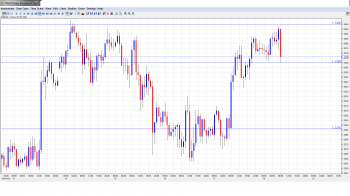EUR/USD reacted positively to positive economic data out of the US on Thursday, and is testing the 1.34 line. In Spain, borrowing costs fell, which also helped the euro. It is been a roller-coaster week for the pair, which has seen strong movement in both directions. In economic news, there are no Eurozone releases scheduled for Friday. The markets will be waiting for the US to release Preliminary UoM Consumer Sentiment, one of the most important consumer indicators.
EUR/USD Technical
- Asian session: Euro/dollar was steady, as the pair consolidated at 1.3280. In the European session, the pair has edged higher, and is testing the 1.34 level.
- Current range: 1.3360 to 1.34.
Further levels in both directions:
- Below: 1.3360, 1.3290, 1.3240, 1.3170, 1.3130, 1.3110, 1,3030, 1.30, 1.2960, 1.2624 and 1.2590.
- Above: 1.34, 1.3480, 1.36, 1.3750 and 1.3838.
- 1.34 is under strong pressure as the pair pushes higher. This is followed by resistance at 1.3480.
- On the downside, 1.3360 is the next line of support. This line is slightly stronger as the pair trades close to 1.34.
Euro/dollar up after solid US data – click on the graph to enlarge.
EUR/USD Fundamentals
- 14:55 US Preliminary UoM Consumer Sentiment. Exp. 75.1 points.
- 14:55 US Preliminary UoM Inflation Expectations.
For more events and lines, see the Euro to dollar forecast
EUR/USD Sentiment
- Euro shoots up after mostly positive US data: Market sentiment jumped on Thursday, as the US released outstanding employment and housing numbers. Unemployment Claims, which had looked weak in earlier January releases, roared back with its best performance in five years, dropping to 331 thousand new claims. This easily beat the forecast of 369K. Housing Starts also were outstanding, improving to 0.95 million. This beat the forecast of 0.89M, and was the indicator’s highest level since June 2008. Building Permits was not as spectacular, but also came within market expectations. The key indicator remained at 0.90 million, just shy of the estimate of 0.91M. The positive numbers were not echoed by the Philly Fed Manufacturing Index, which fell back into negative territory. The key manufacturing indicator plunged to -5.8 points, a very sharp drop. This surprised the markets, which had expected a small drop from 8.1 to 7.1 points. Coming on the heels of the Empire Manufacturing Index, which also looked dismal, these indicators point to significant contraction in the US manufacturing sector, which is weighing on the fragile economic recovery.
- Euro fluctuates after ECB comments: Earlier in the week, the euro dropped following negative remarks by Jean-Paul Juncker, only to reverse direction after another senior ECB official stated the opposite. Juncker, held of the Eurogroup, shook up the markets after bluntly warning that the “euro foreign exchange rate is dangerously high”. The markets jumped on his comments, and the euro quickly headed south, falling below the 1.33 line. On Wednesday, a member of the ECB governing council, Ewald Nowotny, weighed in, stating that the Eurozone situation had shown improvement, and the ECB was not concerned about the recent gains by the euro. These positive sentiments gave a boost to the euro, as it barreled above 1.33. Market players, scrambling to keep up with the latest comments of the day about the value of the euro, must be hoping for more action and less talk from senior ECB officials.
- World Bank report pessimistic: In a report released earlier this week, the World Bank downgraded its forecast for global growth. In its Global Economic Prospects report, which is issued twice a year, the prestigious institution said that global growth in 2013 would be 2.4%. This was down from the 3.0% estimate the World Bank stated in its June 2012 report. The World Bank noted persistent weaknesses in the developed economies, citing austerity measures, high unemployment and weak business confidence. The report also sounded the alarm over the damage in market confidence due the ongoing fiscal battles in the US, and urged a quick resolution of the issue so as to ensure market stability.
- German locomotive losing steam: The once mighty German economy continues to be a source of concern. Recent economic data points to serious trouble in the Eurozone’s largest economy. Trade Surplus dropped to its lowest levels since May, and German Factory Orders fell by 1.2%. German Industrial Production, an important manufacturing indicator, also looked sluggish. For the third straight month, German WPI fell well below the market forecast. If the Eurozone is to get back on its feet later this year, it will need Germany to lead the way.
- Bernanke Quiet on QE, urges debt ceiling agreement: In a speech earlier this week, Fed Reserve Chair Bernard Bernanke may have disappointed some, as he did not give any clues about when the current round of QE might end. Bernanke did little more than express his concern about the speed of the US recovery. He noted that the economy has shown signs of improvement, but he was still unsatisfied with the economy’s progress. Given these sentiments, it seems unlikely that the Fed will consider ending the current round of QE in 2013, barring a spectacular recovery by the US economy during the year. Underscoring this point, the president of the San Francisco Federal Reserve Bank, John Williams, stated that he expected the Fed to continue its bond buying program “well into the second half of 2013.” Although Bernanke avoided talking about QE, he was more forthcoming with regard to the debt ceiling issue, which is likely to be a hot topic, if not a full-blown crisis, in February. The US is quickly approaching its debt limit of $16.4 trillion, and Bernanke said Congress must act and raise the debt ceiling. He further noted that tinkering with interest rates will not make much difference, but that if Congress ensures that the country’s fiscal house is in order, interest rates would gradually rise as the economy improves.

